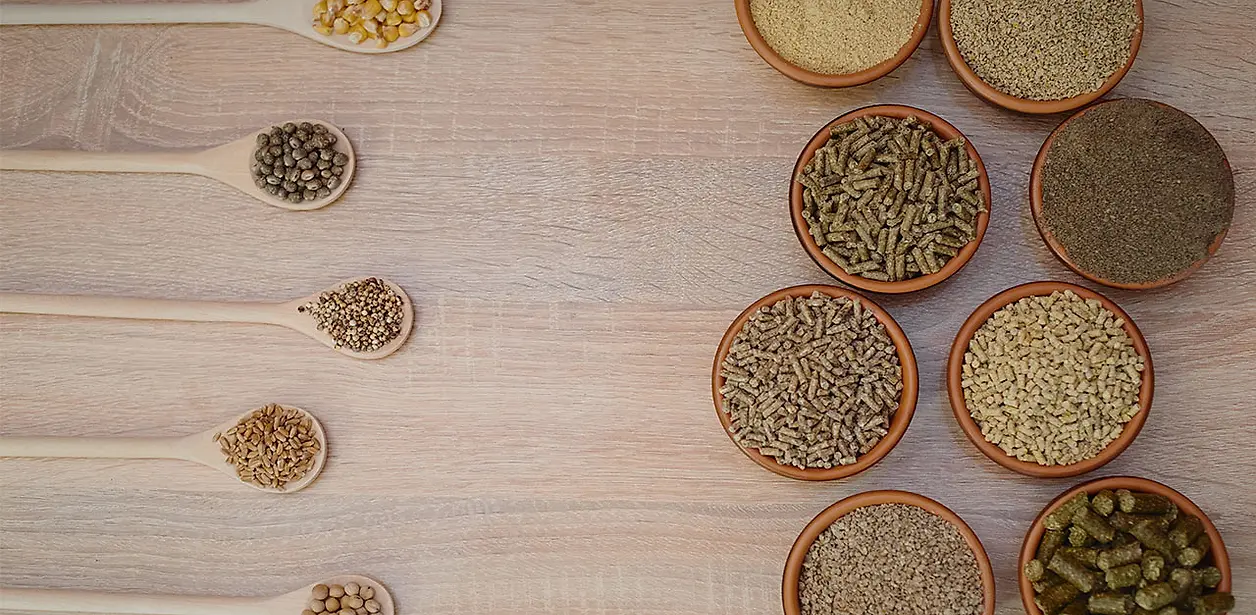ISO 106352 Gross Energy Determination in Fish Feed Pellets
The process of Gross Energy Determination in Fish Feed Pellets (ISO 106352) is a critical step for ensuring the quality, safety, and efficacy of feed products. This method plays an essential role in compliance with international standards and regulations to guarantee that fish feeds meet specific nutritional requirements.
The primary objective of this service is to measure the gross energy content of fish feed pellets using standardized procedures based on ISO 106352. The process involves determining the amount of heat released when a sample undergoes combustion in an oxygen atmosphere under controlled conditions. This measurement provides valuable insights into the caloric value and overall nutritional composition of the product.
The gross energy content is crucial for several reasons. For instance, it helps to assess the feed's digestibility and nutrient availability. By accurately measuring the energy content, manufacturers can optimize formulations to meet specific dietary requirements without overloading or underfeeding nutrients. This not only enhances fish health but also contributes to sustainable aquaculture practices.
During sample preparation, pellets are ground into a fine powder using appropriate sieves to ensure uniformity and reproducibility of results. The precision of this step is critical as it directly impacts the accuracy of the subsequent energy determination. Once prepared, samples undergo combustion in an oxygen bomb calorimeter, which measures the heat released during the reaction.
The test procedure strictly adheres to ISO 106352, ensuring consistency and reliability across different laboratories. Compliance with this standard is essential for maintaining uniformity and comparability of results internationally. The protocol includes detailed instructions on sample preparation, combustion conditions, data analysis, and reporting.
Accuracy in the energy determination process can influence various aspects such as feed efficiency, growth performance, and overall health of farmed fish. By providing precise measurements, this service supports informed decision-making by aquaculture professionals regarding feed formulations and resource allocation.
The importance of this method extends beyond mere compliance; it serves as a tool for continuous improvement in the industry. Regular monitoring of energy content allows manufacturers to identify trends and make necessary adjustments to their processes or product formulations.
- Enhanced nutrient availability: Ensures that the feed is optimally formulated, maximizing its nutritional value.
- Better feed efficiency: Helps in minimizing waste while ensuring optimal growth rates of fish.
- Sustainability: By optimizing energy content, the industry can reduce resource consumption and environmental impact.
- Regulatory compliance: Ensures adherence to international standards for quality assurance.
- Informed decision-making: Provides data that supports strategic planning in aquaculture operations.
These benefits underscore the significance of accurate gross energy determination, not just as a regulatory requirement but also as an integral part of maintaining high-quality feed products. This service ensures that every batch of fish feed meets rigorous standards and contributes to the overall success of aquatic farming enterprises.
Applied Standards
The ISO 106352 standard provides detailed procedures for determining gross energy in animal feeds, including fish feed pellets. This method is widely recognized for its reliability and accuracy across various laboratories globally. The procedure involves the combustion of a known mass of sample under controlled conditions to measure the heat produced.
For fish feed pellets specifically, this standard ensures that the testing process accounts for the unique characteristics of these products. It guides on proper sample preparation, which is crucial given the varying densities and textures of different types of fish feed. The standard also specifies the instrumentation and environmental controls necessary to conduct precise measurements.
The ISO 106352 method is complemented by other relevant standards such as ISO 6869 for moisture determination in animal feeds, which is often conducted alongside gross energy analysis to ensure comprehensive quality checks. Together, these standards provide a robust framework that supports consistent and accurate testing across the industry.
Adherence to these international standards ensures that results from different laboratories are comparable and reliable. This consistency is vital for maintaining trust within the industry and facilitating trade between countries with differing regulatory requirements.
Eurolab Advantages
At Eurolab, we pride ourselves on offering world-class services that meet international standards with precision and reliability. Our expertise in ISO 106352 gross energy determination is complemented by advanced instrumentation and experienced technical staff.
- State-of-the-art equipment: Equipped with high-precision calorimeters, we ensure accurate measurements every time.
- Expertise and experience: Our team comprises highly skilled professionals who have extensive experience in feed testing and quality assurance.
- Comprehensive support: Eurolab provides not only the test but also detailed reports and recommendations for improving product formulations based on our findings.
- Regulatory compliance: Ensuring that all tests comply with international standards, we help clients meet their regulatory obligations efficiently.
- Prompt turnaround times: We understand the importance of timely results in the industry. Our efficient processes ensure quick delivery without compromising on quality.
- Customized solutions: Eurolab offers tailored services that cater to specific client needs, whether it’s for research and development or routine quality control.
By leveraging our extensive knowledge and resources, we provide clients with reliable data they can trust. This service is just one of many ways Eurolab supports the food & feed testing sector in delivering high-quality products that meet global standards.





